UPSC Chemistry Optional Syllabus – Download UPSC Chemistry Syllabus PDF
By BYJU'S Exam Prep
Updated on: November 14th, 2023
UPSC Chemistry Optional Syllabus will look relevant to those candidates who have done their bachelor’s or masters in chemistry. Chemistry optional is a scoring subject because there is an adequate score for equations and diagrams. Most of the UPSC chemistry optional syllabus is static, and there is less competition in this subject as fewer candidates take it as optional.
Questions asked from the UPSC chemistry optional syllabus in the mains exam are of honors level, meaning candidates with a chemistry degree will find the subject scoring. Applicants from other educational backgrounds might find it difficult to comprehend. To score well in the exam, the candidates must be proficient in applying the concepts of Chemistry. They must be well-acquainted with the UPSC Chemistry optional syllabus.
Table of content
What is UPSC Chemistry Syllabus?
UPSC chemistry syllabus would feel familiar to chemical engineers, medical professionals, doctors, HAZMAT specialists, candidates who have done their graduation and post-graduation in chemistry, etc. Even though chemistry is a mark-fetching subject, the candidates should come up with a robust UPSC study plan to complete the UPSC Chemistry Optional Syllabus.
The UPSC chemistry optional syllabus will ask a total of 500 marks questions. There will be two papers, Paper 1 and Paper 2, each with 250 marks.
| UPSC Chemistry Syllabus | Topics | Marks |
| UPSC Chemistry Optional Syllabus Paper 1 | Atomic Structure, Chemical Bonding, Solid State, The Gaseous State and Transport Phenomenon, Liquid State, Thermodynamics, Phase Equilibria and Solutions, Electrochemistry, Chemical Kinetics, Photochemistry, Surface Phenomena and Catalysis, Bio-inorganic Chemistry, Coordination Compound, Main Group Chemistry, General Chemistry of ‘f’ Block Elements | 250 Marks |
| Chemistry Optional Syllabus Paper 2 | Delocalized Covalent Bonding, Reaction Mechanisms, Pericyclic Reactions, Preparation and Properties of Polymers, Synthetic Uses of Reagents, Photochemistry, Spectroscopy | 250 Marks |
UPSC Chemistry Optional Syllabus PDF
Below we have given the direct link to download the UPSC chemistry optional syllabus. The PDF will assist the candidates in noting the main topics of the exam. It is highly advised to the candidates to get completely conversant with the Chemistry optional UPSC syllabus before picking the subject as the selection of the optional subject will highly determine the performance of the candidates in the exam.
Chemistry UPSC Syllabus PDF
Candidates must download the UPSC chemistry syllabus and take a printout, as it will help them to cover the subject systematically and ensure that they won’t miss any topics. Aspirants from Hindi medium can also download the UPSC Chemistry Syllabus PDF in Hindi.
UPSC Chemistry Syllabus Paper 1
Paper 1 of the UPSC chemistry optional syllabus includes topics like Atomic structure, chemical bonding, solid-state, etc. Let’s dig a little deeper to view all the topics covered in this paper. The optional subjects for UPSC highly influence the marks of the candidates in the exam.
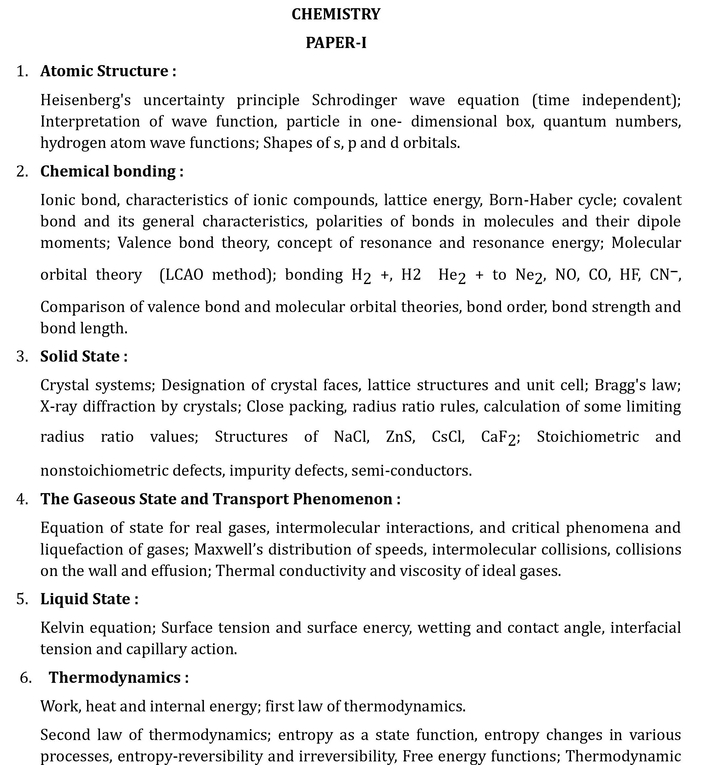
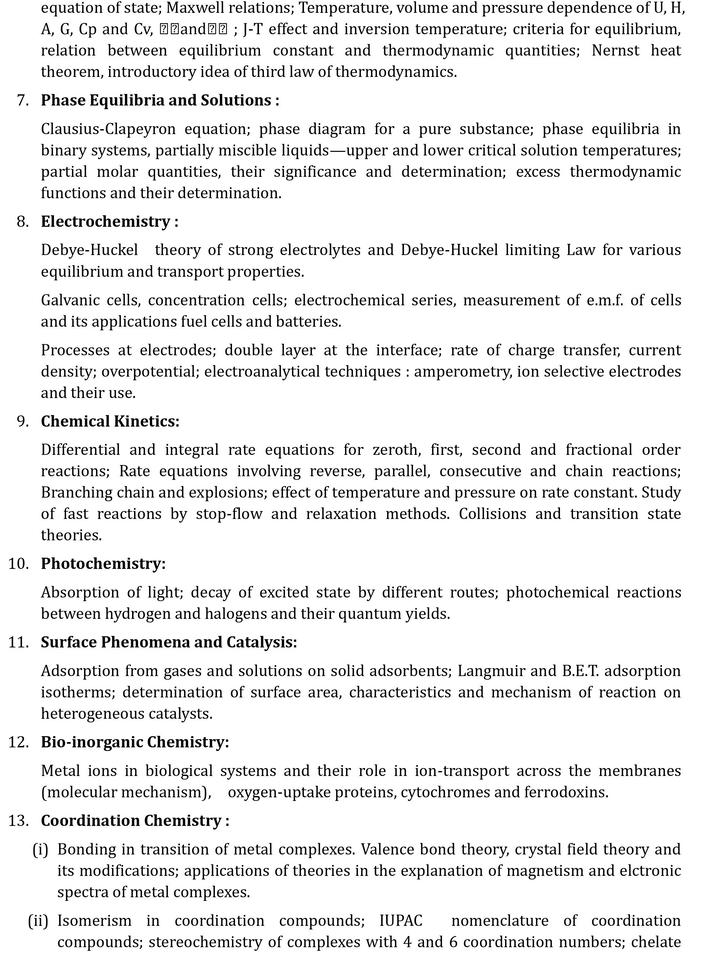
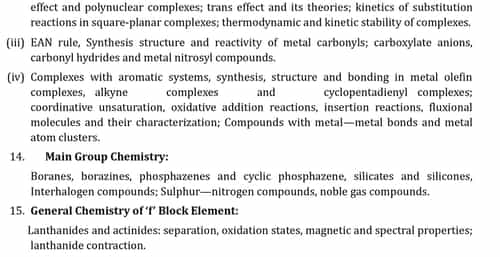
Chemistry Optional UPSC Syllabus Paper 2
Paper 2 of the UPSC chemistry optional syllabus deals with 8 topics and a total of 250 marks questions will be asked from this section. The UPSC preparation strategy for beginners will include the comprehension of the core concepts and fundamentals. Check here the detailed illustration of the Chemistry optional UPSC syllabus.
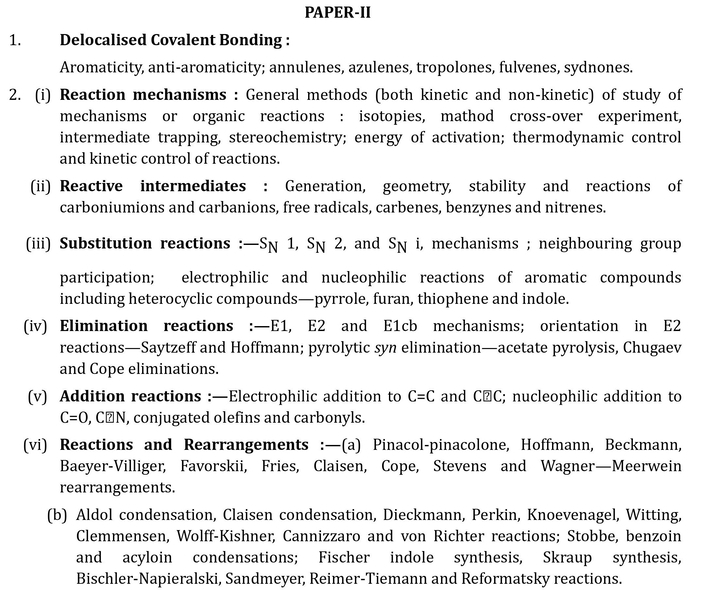
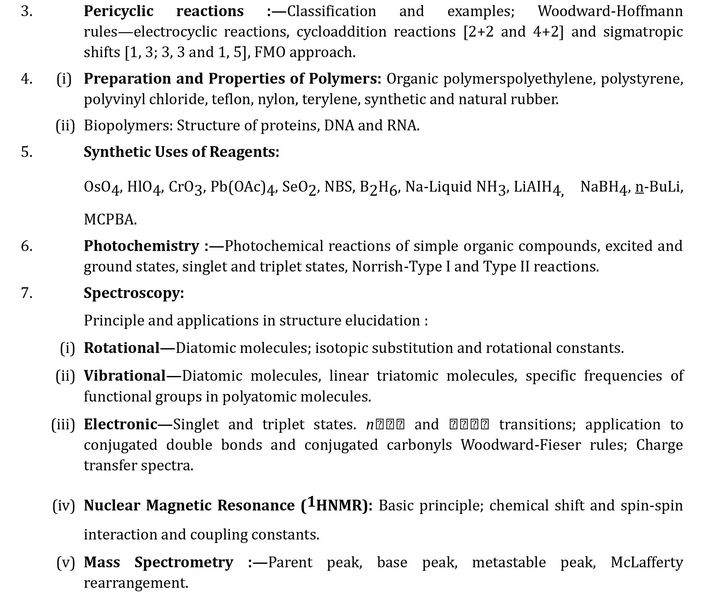
How to Prepare Chemistry Optional Syllabus?
It is essential to cover the whole UPSC chemistry optional syllabus to bag good ranks in the IAS exam. That is why we have come up with an effective UPSC preparation strategy that would help you to cover the UPSC chemistry syllabus smartly.
- Have a thorough understanding of the UPSC chemistry syllabus, and be well-versed with the topics covered in the syllabus.
- Make sure to analyze UPSC previous year question papers and try to comprehend the portion of the UPSC chemistry syllabus where the questions are repeatedly coming.
- Make short notes for all topics, and give them a read before appearing for the exam.
- Do regular revisions after completing the topic from the UPSC chemistry optional syllabus for better retention.
Best Books for Chemistry UPSC Syllabus
To build a strong foundation and cover the UPSC chemistry syllabus in the best way possible, candidates need to follow the best books. Below we have listed some of the highly preferred books for UPSC chemistry. The best UPSC study material will assist the candidates in framing an effective and methodical strategy for the exam.
- Principles of Physical Chemistry By Puri, Sharma & Pathania
- Physical Chemistry by KL Kapoor
- NCERT textbooks of classes XI and XII for Chemistry
- Inorganic Chemistry by James Huheey
- Organic Chemistry by Peter Sykes
- Organic Chemistry by Clayden
- An Introduction to Electrochemistry by Samuel Glasstone
- Concise Inorganic Chemistry by J.D. Lee
- Spectroscopy of Organic Compounds by PS Kalsi
- Photochemistry and Pericyclic Reactions by Jagdamba Singh
Other optional subject syllabi apart from UPSC chemistry optional syllabus are given below for better comparison.
